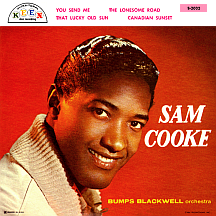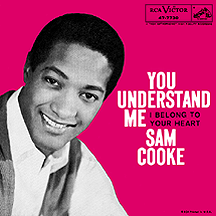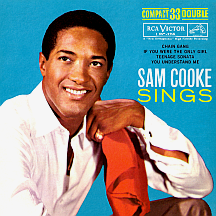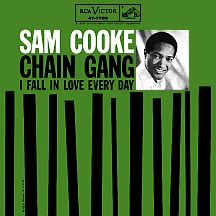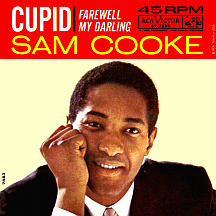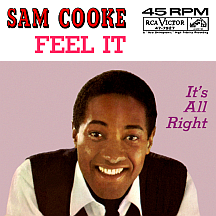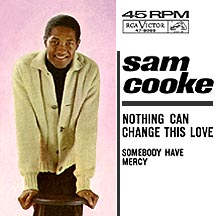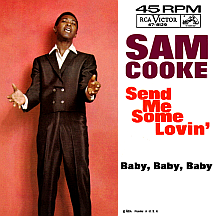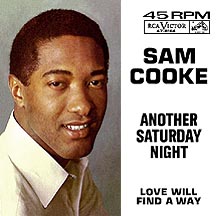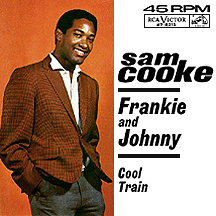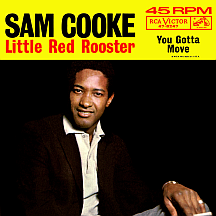SAM COOKE
If it's possible for a gospel singer to be a teen idol or even, dare I say, a sex symbol, then Sam Cooke may have come closest. In the early 1950s when he was with The Soul Stirrers, he made a gradual transition from awkwardly promising singer of praise to dynamic lead vocalist with an image some felt bordered on sacrilege. Yet it came natural to him, much in the way Elvis Presley claimed he couldn't help shaking his hips while singing. The group had begun in the early '30s and survived a number of personnel changes through the years, leading to the departure in 1950 of Rebert (R.H.) Harris, one of the outfit's earliest members and a gospel star in his own right. Cooke's ascendancy to the role of main attraction, drawing large crowds of younger-than-usual female admirers drawn to his good looks and unbridled moves onstage, was surely a sign of changing times. Though he struggled with the decision, it was inevitable he would one day become a pop singer.
One of eight children, Samuel Cook was born in 1931 in Clarksdale, Mississippi, but grew up in Chicago, a choir singer in the church of his father, Reverend Charles Cook. In 1940 he and four of his silbings formed a group called The Singing Children. Gospel music was at the center of his life; pop, blues, swing or any sort of "worldly" music was strictly forbidden. By the time he was 15 he was in a teenage quartet called The Highway Q.C.s, named after Chicago's Highway Baptist Church. After graduation from high school, he found himself in the right place at the right time: the Soul Stirrers needed someone to replace R.H. Harris. Sam, rough edges and all, was given the job, at first simply imitating his predecessor (and doing a very good job of it, according to Harris). The Stirrers began recording for Specialty Records at about that time and within a few years reached their peak of popularity thanks in large part to Cook, who had firmly taken the spotlight by 1953 or '54.
Sam was more than merely a voice and stage presence; he began writing songs during his time with the group and impressed those around him with how deeply he felt the joy of his saviour ("Touch the Hem of His Garment" and "Be With Me Jesus," fine examples of the many songs he wrote and recorded with the Soul Stirrers, reveal a clear connection between his spiritual style and what was to come). He resisted the urge to cross to the other side, but the call to secular decadence had taken hold by 1956; he craved solo stardom, though it went against his upbringing. Specialty owner Art Rupe was more than happy to give him a chance and in early '57 he released "Forever" under the thinly-veiled pseudonym Dale Cook. The arrangement of the song (written by saxophonist and Specialty recording artist Alvin "Red" Tyler) was structured along the lines of his spiritual recordings but with romantic lyrics like 'If I could see your tender smile...and hold you close just a little while...' No one was fooled; his voice was instantly recognizable to anyone already familiar with his work. He dropped the pretense and added an "e" to his last name. Sam Cooke had made the transition.
Rupe teamed him with Robert "Bumps" Blackwell, a producer and songwriter at Specialty who'd worked with Lloyd Price and had more recently been key to the screamin' success of Little Richard. Several recordings were completed before Blackwell took a position in artists and repertoire at Keen Records, based in Los Angeles (as was Specialty), taking Cooke with him. "You Send Me" (with writer credit given to his brother, L.C. Cooke, though it's widely believed Sam composed the song) was his first single for the label and made a major impact in the fall of 1957, hitting number one in December, knocking off Elvis' "Jailhouse Rock" in the process and turning Sam's dreams to reality much sooner than anticipated.
"You Send Me," of course, is one of the great classics of the 1950s, with its '...honest you do, honest you do' refrain and vocal runs that have been imitated ever since. Sam captured a large audience in one fell swoop, a fan base that grew over the next several years as his presence on radio and television, in addition to his live performances, remained steadfast. Specialty immediately followed with an earlier recording, "I'll Come Running Back to You" (with "Forever" on the flip) and it was a top 40 hit in early '58. The next Keen single, "(I Love You) For Sentimental Reasons" (written by William "Pat" Best, it had been Nat "King" Cole's first number one hit with The King Cole Trio in 1947), was a conscious attempt to gain favor with an older audience. It peaked mid-chart, as did the flip side, "Desire Me" (the only notable hit for songwriter Bruce Culver), a disappointment in the wake of "You Send Me." But there was little need for concern.
Sam desired success in more than just one field, be it gospel, rhythm and blues or rock and roll. He signed with the William Morris Agency in early 1958, by then a 60-year-old entertainment powerhouse known for taking many film and music acts to levels of fame surpassing that of mere household names. In March, the agency succeeded in getting him booked at New York's prestigious Copacabana nightclub, but momentum slowed when an auto accident in Arkansas, en route to a performance date, killed his chauffeur, seriously injured Lou Rawls (a member of gospel group The Pilgrim Travelers) and landed Sam in the hospital for several weeks. He resumed recording at the first opportunity while hit records came at a steady clip: "Lonely Island" (from the pen of Eden Ahbez, famous for Cole's '48 megahit "Nature Boy") and Cooke originals "You Were Made For Me" and "Win Your Love For Me" were solid sellers in '58.
He severed ties with Bumps Blackwell around this time, putting his fate in the hands of Jess Rand of the Morris agency; Blackwell moved on and joined the staff of Mercury Records the following year. Meanwhile Sam's first marriage, to Delores Mohawk, had ended and in no time he was back together with his childhood sweetheart, Barbara Campbell, who he had first met when she was 12 and had begun dating a couple of years later. With the rights to some of the songs Sam and/or his brother L.C. had written tied up in a battle for royalties between Specialty, Keen, Blackwell and the Cooke brothers, a different ploy was devised. Barbara's name began showing up as the credited writer on some of Sam's singles, beginning with "Love You Most of All" in late 1958 and its follow-up, "Everybody Likes to Cha Cha Cha" in early '59. Continuing sporadically for the next few years, it's doubtful she had much, if anything, to do with the actual creation of the songs; it's presumed Sam wrote most of them, though contributions were made by L.C. Cooke and other writers, including Lou Adler and Herb Alpert.
In 1959 the rock and roll movement of America's youth was making its strongest impact in record sales thus far. Sam, at age 27, was still in touch with his inner adolescent and scored a hit with "Only Sixteen" (which again designated Campbell as the songwriter). With Jess Rand's help he started his own label, SAR Records (partnering with J.W. Alexander and Roy Crain, the "A" and "R" to Sam's "S" in the company's name); The Soul Stirrers, still going strong, supplied the label with its inaugural release. Sam also set up his own publishing company, Kags Music, bringing him closer to his goal of artistic and financial independence. In 1960 the agency secured Cooke a contract with RCA Victor that granted him control over his own works while allowing him to continue running SAR.
With top-notch producers Hugo Peretti and Luigi Creatore at the helm, his first single, Jeff Barry's "Teenage Sonata," a more elaborate production than the typical Keen recording, was considered a surefire smash. In February, RCA Victor ran full page ads in the trade papers in support of the singer's label debut. In March everyone watched as the record climbed to number 50 - halfway up the Billboard chart - before plummeting in April. RCA's second single, "You Understand Me" (written by seasoned songwriters Al Hoffman and Dick Manning with Hugo and Luigi using the pseudonym Mark Markwell), eschewed the big string section in favor of a simpler, more Keen-like midtempo ballad, but it failed to chart. Keen, in the meantime, scored a hit with the infectious "Wonderful World" ("Don't know much about history...don't know much biology...'), a previously unreleased track recorded prior to his departure from the label. The song has become one of Sam's most popular standards.
RCA executives, who at first had underestimated Cooke's composing skills by prioritizing songs written by others, adjusted their thinking; if the success of "Wonderful World" indicated anything, it was that his music still had a market and he was most effective when interpreting his own written works. The next single, "Chain Gang," proved the theory. Written by Sam and his brother Charles Cooke, it conjured an image of prison workers that was dated by perhaps a few decades but was, in fact, inspired by a group of chain gang workers the two had spotted during their travels. Cooke took control of the production while recording the song, doing retakes until he had the result he wanted...and it paid off. The record hit number two in October 1960, his biggest hit since "You Send Me" three years earlier.
Single releases were consistently strong after this, with "Sad Mood," "Cupid" and "Feel It," all composed by Sam, performing well in sales and airplay in '60 and '61, as well as the Roy Alfred-Del Serino song "That's It - I Quit - I'm Movin' On," also a hit, benefiting from his expert handling of the lyrics, thematically in sync with his own experiences, both personally and professionally. SAR Records, after nearly two years, finally made its mark with L.A. duo The Sims Twins, brothers Bobby and Kenneth, and their recording of Cooke's "Soothe Me," a top ten R&B hit near the end of the year.
Several artists established themselves in the business with their recordings for SAR and sister label Derby, including Billy Preston, Johnnie Taylor, Mel Carter and The Valentinos, another brother act made up of Cecil Womack and future solo soul star Bobby Womack. Sam used SAR in part as a training ground for singers he felt had potential for greatness; acts like Taylor, Carter and the Womack brothers started out sounding uncannily similar to their mentor but each developed a distinctive sound as time progressed (if there is one weakness in Sam's development of talent, it's that of the few women who recorded for his labels, none broke through with even a minor hit). Many of the songs he wrote were given to SAR artists to record before Sam put his own vocal stamp on them. Johnnie Morisette had a hit with "Meet Me at the Twistin' Place" in the spring of 1962; Sam later reworked it as "Meet Me at Mary's Place." After taking first dibs on "Soothe Me," the Sims Twins recorded "That's Where It's At" in 1963, about a year before Sam's version. Johnnie Taylor was given first shot at "Rome Wasn't Built in a Day."
A few of Sam Cooke's all time best-loved original songs made their debuts in 1962. He became a part of the "Twist" phenomenon with "Twistin' the Night Away," quite possibly the best of the more than 40 Twist hits save for Hank Ballard's original recording of "The Twist" and, by default, the multi-million-selling version of same by Chubby Checker, the spark that set the flame ablaze in the first place. The song returned him to the top ten in March and helped keep the three-year-old dance craze in vogue for many months (even years) to come. "Having a Party" (which included its own "Twist" reference) and "Bring it on Home to Me" came next, both featuring Lou Rawls (whose strong vocals gave the latter a duet sound). Each ranks among his career best and have been remade through the years by younger up-and-comers who proudly single out Cooke's lasting influence on their work.
1963 had its highs, lows and one miscalculated business decision. The highs, of course, were the ongoing hit records and enthusiastic reception he received whenever he performed for audiences. The low point, by far, was the accidental death of Sam's 18 month old son Vincent; he was touring at the time the child drowned in the family's pool while under Barbara's supervision. Sam blamed her for the tragedy, which caused further deterioration of the couple's marriage, already shaky due to his indiscretions with women (Barbara is said to have reacted by having one or two affairs of her own).
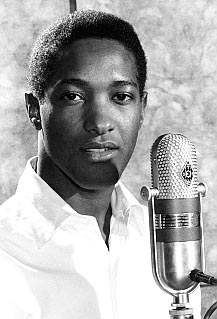
The business move, on the other hand, must have seemed like a good idea at first. Allen Klein was hired to take control of Sam's interests, including his singing career. Klein negotiated a deal with RCA that led to the founding of Tracey Records, to be distributed by the parent company (though the label didn't materialize until some years later under a different name, ABKCO). Klein began controlling all aspects of Cooke's career, and while it may have seemed logical for the short term, it turned out to be a poor business decision in retrospect, as he secured the rights to all of Sam's music, then proceeded to keep most of the Cooke catalog out of general release for decades afterward (he pulled the same stunt with The Animals, Herman's Hermits and others, The Rolling Stones' 1960s recordings and the entire output of the Cameo-Parkway labels, also making an unsuccessful attempt at putting a lock on the beloved masters of The Beatles).
Cooke reached the top ten in '63 with "Another Saturday Night," his somewhat humorous account of the lonely life of a single man, stuck on date night with a girl who '...had a strange resemblance to a cat named Frankenstein!' He rounded out the hit-filled year with remakes of two traditional songs, each liberally adapted to his personal style: "Frankie and Johnny," with its violent end to a failed romance, a story that went on to have a devastating parallel in Cooke's own life, and the Willie Dixon blues number "Little Red Rooster," based on several earlier variations of the tune, Sam's rendition being markedly different from the version waxed by Howlin' Wolf a few years earlier.
The British Invasion led by the Beatles in 1964, by the way, didn't dampen Cooke's impact on radio or record sales as it did for many other artists. He rolled right into 1964 with two near-miss top ten pop hits (both of them R&B number ones), the exuberant "Good News" and gospel-flavored "Good Times." In early 1965, he hit the top ten on the pop charts one last time, with the dance tune "Shake," yet it was the record's B side that became a benchmark in his career.
Sam wrote "A Change is Gonna Come" in 1963 after hearing Bob Dylan's "Blowin' in the Wind," a hit that summer for Peter, Paul and Mary. That song's message was one of futility, an emotion not unfamiliar to Cooke, and it inspired him to attempt something similar yet specific to his own set of experiences and frustrations, exemplified by lines like '...I go to my brother...and I say brother, help me please...but he winds up knockin' me back down on my knees...' and the unforeseen personal prophecy of 'It's been too hard livin', but I'm afraid to die...' The song ends on a more positive note than Dylan's: 'It's been a long time comin', but I know...change gonna come.' Few songs do a better job of summing up the latter half of the 20th century.
Rene Hall, the musical director on many of Sam's recordings since his days at Specialty, gave the song an orchestral arrangement with brilliantly effective french horns. "A Change is Gonna Come" was recorded in December 1963 but the label initially released it only as an album cut, possibly due to concerns that it wasn't what the public expected from him; more likely they had cold feet about putting out anything with the slightest hint of controversy. After what happened the following December they decided the timing was right, though 34 seconds containing the line 'I go to the movie and I go downtown...somebody keep telling me don't hang around' was edited from the single version for reasons known only to the overly sensitive powers at RCA Victor Records. It was a top 40 hit in early 1965 at the same time "Shake" went top ten, but its impact has endured far beyond that of its A side. The song became closely identified with the Civil Rights movement and is now embedded in the public's consciousness, a classic that's still as strong as ever. A handful of minor hits came afterward, some of them rereleases of earlier Keen tracks, with the whimsical "Sugar Dumpling" getting him into the top 40 for the final time, in the summer of 1965. But these songs, from "Shake" onward, were all part of the aftermath. It's time for me to backtrack and recount, if briefly, the tragedy that occurred in December 1964.
A series of poor judgments led to his death in the early hours of December 11. He took a young woman, later identified as Elisa Boyer, to the Hacienda, a cheap motel on South Figueroa Street in Los Angeles. Sometime around 3AM, she left carrying most of her clothes as well as his, and possibly a considerable amount of cash he was carrying. He came out wearing only a jacket and shoes and pounded on he doors of the motel office. The clerk on duty, a woman named Bertha Franklin, claimed she had to fight him off. Pulling a gun, she fired three shots and he died on the floor of the motel. Opinions, based in part on police reports and testimonies, vary as to what actually happened. Had he taken Boyer there to molest her, as she claimed? Was it her plan to simply steal his money and leave? What motivated him to aggressively approach the motel manager? Boyer's side of the story contradicted many of the other details; she was picked up for prostitution about a month later, which cast further doubt on her intentions that night. Mrs. Franklin claimed she acted out of fear for her own safety; a coroner's jury ruled the shooting a justifiable homicide. The incident's many inconsistencies have never been fully resolved.
There were two funeral services. His body was flown to Chicago where thousands of mourners showed up in sub-freezing weather to pay their respects, then back to Los Angeles for a public viewing at Mount Sinai Baptist Church. In all, some 200,000 fans (some of them curiosity seekers, perhaps) showed up, an unprecedented turnout requiring heavy security to keep things from getting out of hand. His close friend Lou Rawls sang at the service, as did several others including Bobby Bland and Ray Charles. There were five thousand in attendance, though the church had a capacity of only 1500. Sam Cooke was greatly admired during his short lifetime, his musical contributions are considerable, his indiscretions unfortunate, his end tragic. His music is what matters most. His legend continues to grow.
NOTABLE SINGLES:
- Forever - 1957
as Dale Cook - You Send Me /
Summertime - 1957 - I'll Come Running Back To You - 1958
- (I Love You) For Sentimental Reasons /
Desire Me - 1958 - Lonely Island /
You Were Made For Me - 1958 - Win Your Love For Me - 1958
- Love You Most of All /
Blue Moon - 1958 - Everybody Likes to Cha Cha Cha - 1959
- Only Sixteen /
Let's Go Steady Again - 1959 - There, I've Said it Again - 1959
- No One (Can Ever Take Your Place) - 1960
- Teenage Sonata - 1960
- You Understand Me - 1960
- Wonderful World - 1960
- Chain Gang - 1960
- Sad Mood - 1960
- That's It - I Quit - I'm Movin' On - 1961
- Cupid - 1961
- Feel It /
It's All Right - 1961 - Twistin' the Night Away - 1962
- Having a Party /
Bring it on Home to Me - 1962 - Nothing Can Change This Love /
Somebody Have Mercy - 1962 - Send Me Some Lovin' /
Baby, Baby, Baby - 1963 - Another Saturday Night /
Love Will Find a Way - 1963 - Frankie and Johnny - 1963
- Little Red Rooster - 1963
- Good News - 1964
- Good Times /
Tennessee Waltz - 1964 - Cousin of Mine /
That's Where It's At - 1964 - Shake /
A Change is Gonna Come - 1965 - It's Got the Whole World Shakin' /
(Somebody) Ease My Troublin' Mind - 1965 - Sugar Dumpling - 1965
- When a Boy Falls in Love - 1965
- Meet Me at Mary's Place - 1966


